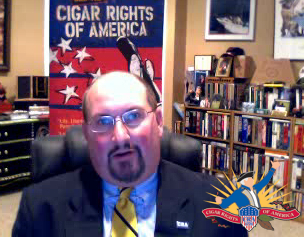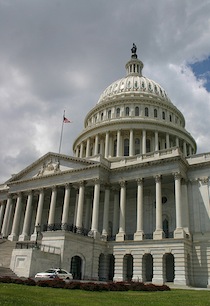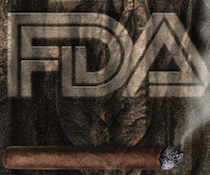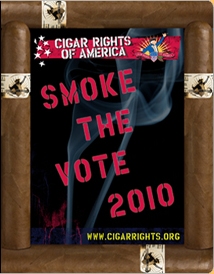Last night, Cigar Rights of America held their first “CRA TV” webcast. The broadcast streamed live from CRA headquarters and featured CRA Executive Director Glynn Loope speaking about CRA’s important mission and how the group, which is less than two years old, is working to accomplish its goals.

Loope described the founding of CRA, citing a profound need for the voice for cigar consumers during the SCHIP tobacco tax battle. He then provided a comprehensive list of the states where CRA has been active in the past two years fighting smoking bans (NC, SD, CO, KY, NE, IN, PA, AL, MI, TX, LA, VA, KS, CT, WI, and NV) and fighting tobacco taxes (KY, AR, HI, CA, NH, OR, PA, UT, MI, FL, NY, WA, and MA).
Loope reminded viewers that these battles are important not only for the states directly affected, but because opposition sends a message to those considering similar measures elsewhere. For example, he sees a legal challenge to the New York City law mandating graphic anti-smoking propaganda posters be displayed whereever tobacco products are sold as critical not just for New York but because Boston and possibly other cities are considering similar measures.
Loope also reported on the ongoing rule-making process regarding FDA oversight of cigars. According to Loope, there is “no greater threat” to the cigar industry than FDA regulation of cigars.
Also addressed were the results of the recent election. CRA had endorsed four candidates for governor, 18 candidates for the U.S. House of Representatives, and two candidates for the U.S. Senate. According to Loope, all of these candidates won their races (except for two in the House), although two of the gubernatorial races were too close to call at the time of the broadcast.
When it came to endorsements and other actions by the CRA, Loope stressed that these issues are not partisan. He noted that there are “just as many Republican governors signing smoking bans as Democrat governors.”
Loope announced that the CRA TV broadcast would become a regular weekly way of communicating with members and cigar consumers. Next week’s show, scheduled for Friday, will be live from Casa Fuente in Las Vegas; the exact time has yet to be announced.
Two other announcements were made on the broadcast: First, a new CRA Cigar Sampler will be coming soon. Like past samplers, revenues will support Cigar Rights of America. It is expected out for the holidays. Second, a consumer advisory council will be formed to further ensure that cigar consumer voices are heard, although no details were released about the board’s composition.
–Patrick S
photo credit: Cigar Rights of America
 The new Senate bill marks an important milestone in the movement for cigar rights, where after over a decade of exclusively playing defense, cigar smokers finally have a national bill (introduced in both houses of Congress) to support their rights. The FDA is currently authorized by the 2009 Tobacco Control Act to regulate cigars if it wants, even though the bill doesn’t require cigar regulation.
The new Senate bill marks an important milestone in the movement for cigar rights, where after over a decade of exclusively playing defense, cigar smokers finally have a national bill (introduced in both houses of Congress) to support their rights. The FDA is currently authorized by the 2009 Tobacco Control Act to regulate cigars if it wants, even though the bill doesn’t require cigar regulation.
 “We’re still pushing the bill,†George Cecala, spokesman for Rep. Bill Posey, the Florida Republican who introduced the bill in April, told me the other day. He added that the congressman, described by Cecala as an occasional cigar smoker, is especially concerned about potential job losses if FDA cigar regulations are adopted.
“We’re still pushing the bill,†George Cecala, spokesman for Rep. Bill Posey, the Florida Republican who introduced the bill in April, told me the other day. He added that the congressman, described by Cecala as an occasional cigar smoker, is especially concerned about potential job losses if FDA cigar regulations are adopted. On April 15,
On April 15,  Limited edition smokes can be frustrating. They’re often hard to get and, if you don’t move quickly, you may not be able to buy any, meaning you may have to make a decision before you really know all the details about the smoke. Still, there’s a refreshing bit of honesty in limited edition cigars. Many cigar makers, particularly those who don’t grow their own tobacco, have only enough tobacco to make a small run without sacrificing quality and consistency. So limited releases can be some of the best (if rare) cigars available. For that reason, I welcome more limited cigars, as long as they’re limited for a good reason and not just a marketing gimmick.
Limited edition smokes can be frustrating. They’re often hard to get and, if you don’t move quickly, you may not be able to buy any, meaning you may have to make a decision before you really know all the details about the smoke. Still, there’s a refreshing bit of honesty in limited edition cigars. Many cigar makers, particularly those who don’t grow their own tobacco, have only enough tobacco to make a small run without sacrificing quality and consistency. So limited releases can be some of the best (if rare) cigars available. For that reason, I welcome more limited cigars, as long as they’re limited for a good reason and not just a marketing gimmick. The new warning labels take up the top half of the front and back of each pack of cigarettes. Unlike previous text warnings, they include graphics and many cartoon images. All cigarette packaging will be required to use the new warnings by June 2011.
The new warning labels take up the top half of the front and back of each pack of cigarettes. Unlike previous text warnings, they include graphics and many cartoon images. All cigarette packaging will be required to use the new warnings by June 2011.
 For those who doubt that elections matter, you might re-read
For those who doubt that elections matter, you might re-read  Patrick Ashby
Co-Founder & Editor in Chief
Patrick Ashby
Co-Founder & Editor in Chief Patrick Semmens
Co-Founder & Publisher
Patrick Semmens
Co-Founder & Publisher George Edmonson
Tampa Bureau Chief
George Edmonson
Tampa Bureau Chief